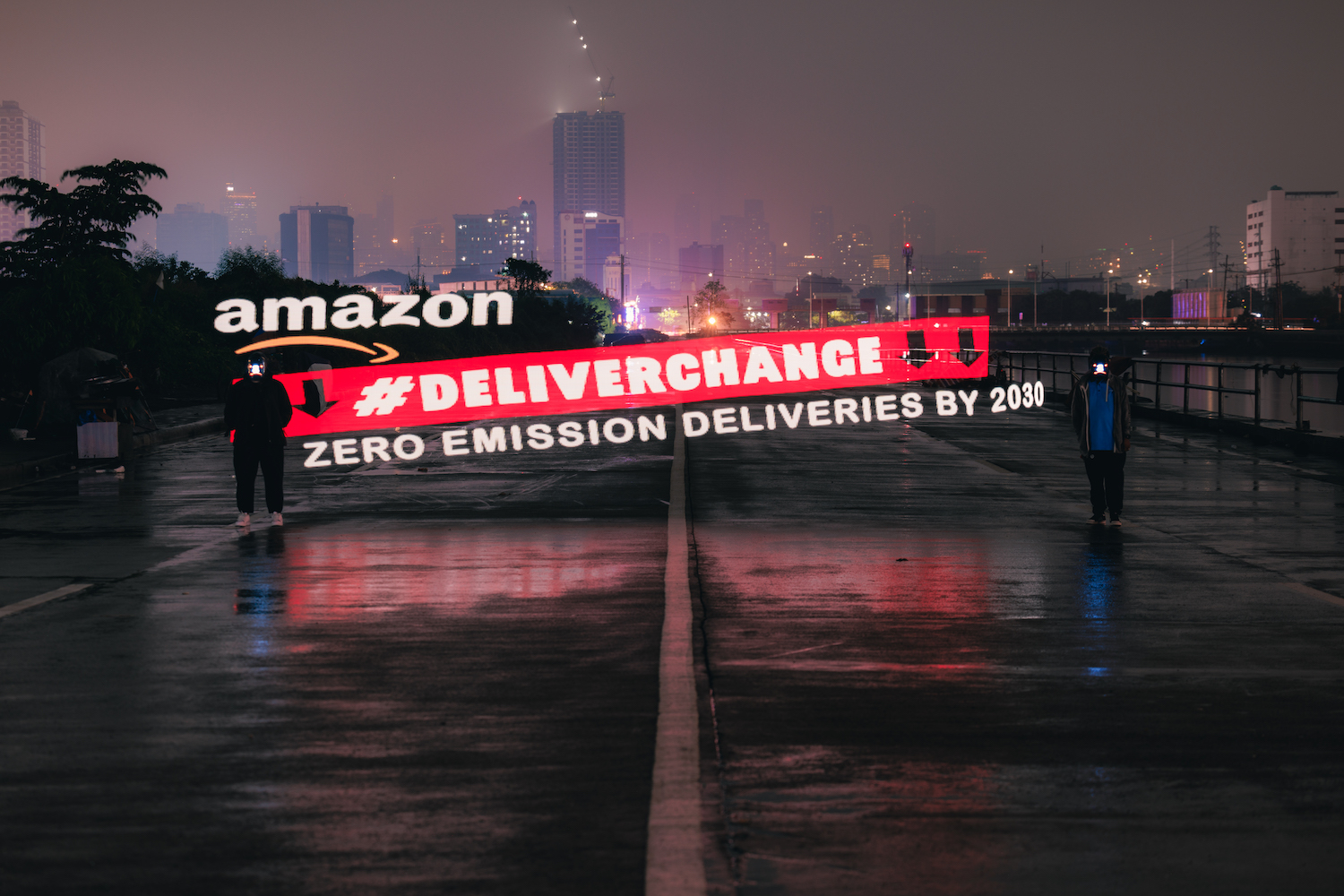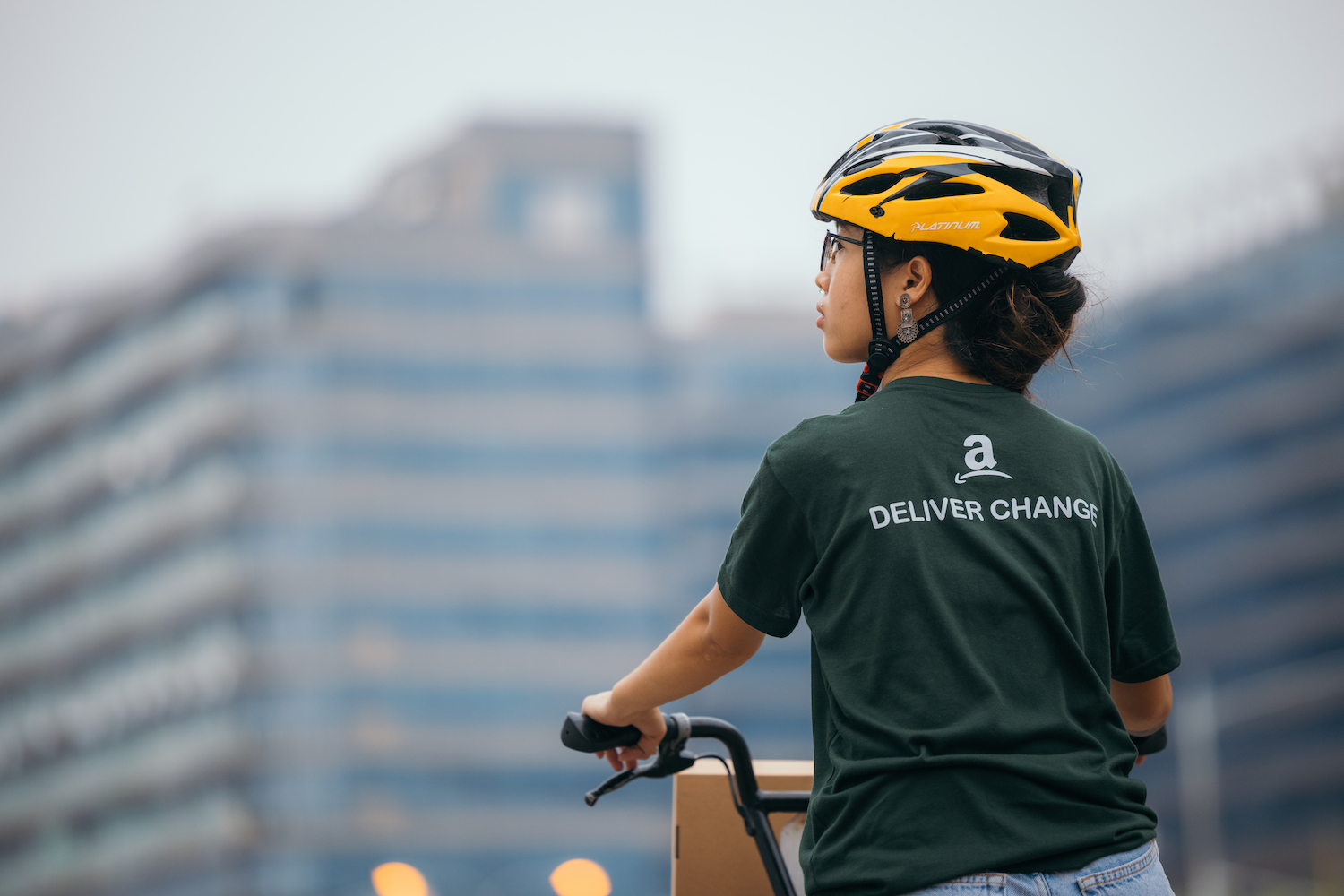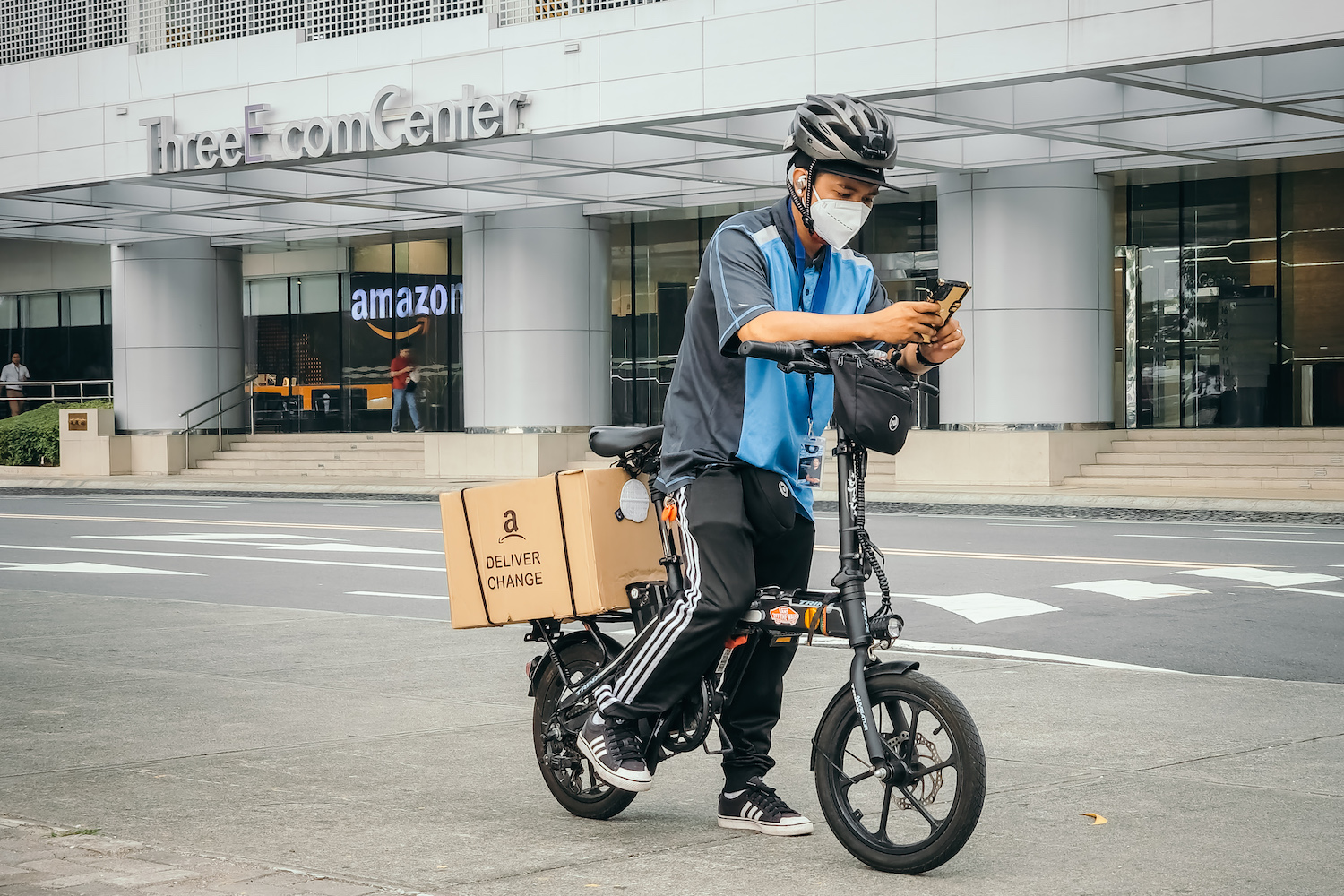Study finds Amazon and global e-commerce companies on track to emit yearly carbon equivalent of up to 44 coal plants, requiring at least one billion trees planted every year to alleviate impacts

350 Pilipinas volunteers staged a creative action at the Amazon Operation Services Philippines in Pasay City to call out Amazon and other delivery companies’ persistent reliance on fossil fuels to transport their e-commerce deliveries. Photo: Jilson Tiu
A joint investigation by Clean Mobility Collective (CMC) and Stand.earth Research Group (SRG) released today finds that Amazon and other leading delivery companies continue to rely on fossil fuels to move their ever-growing e-commerce deliveries, are failing to deploy 100% zero-emission vehicles as promised, and avoid disclosing sufficient data related to last-mile emissions — threatening clean air progress worldwide and amplifying a wide range of health risks and disparities.
Transport is already the world’s largest source of new greenhouse gas emissions that drive climate change, responsible for almost 12% of all emissions worldwide today, and those emissions are expected to increase exponentially by 2030, according to the latest CMC/SRG report, titled Cost of Convenience: Revealing the hidden climate and health impacts of the global ecommerce-driven parcel delivery industry through 2030. The study predicts global annual parcel volume could more than double, from over 315 billion parcels in 2022 to up to 800 billion parcels per year in 2030.
And, even without accounting for this exponential growth, Amazon and global e-commerce companies are on track to emit the annual carbon equivalent of up to 44 coal plants. The equivalent of planting over one billion trees every year — and allowing them to grow for 10 years — would be needed to sequester the carbon emissions of a single year of last-mile parcel deliveries. Alternatively, over 75 million acres of U.S. forests per year would be required to sequester GHGs emitted from a single year of current last-mile deliveries — equal to forest acreage larger than the entire state of Arizona. In terms of European forests, that would be worth 11% of carbon sequestered in one year by European forests.

The creative actions such as using a “frowned” Amazon logo in light painting and hologram masks took place nearby Amazon’s vicinity. Photo: Jilson Tiu
“Unabated growth of last-mile delivery will have significant climate and health impacts if e-commerce companies fail to act at scale before 2030. Amazon, in particular — the sector’s global leader — knows this is a problem and, in turn, has announced net-zero 2040 plans. Based on this new research, not only are Amazon’s plans too weak and a decade too late, the company discloses far less information on last mile delivery than its e-commerce peers about its progress. Amazon and other last-mile delivery companies must urgently commit to 100% zero-emission deliveries by 2030, and begin fully disclosing their emissions and progress in transitioning to clean transportation,” said SRG Investigative Researcher Dr. Devyani Singh.
Air pollution is known to cause significant health defects worldwide, and this new CMC/SRG study found that over the next eight years from 2023-2030, without any changes in fleet makeup, e-commerce companies’ last-mile emissions are projected to contribute up to 168,000 cumulative cases of asthma exacerbation, up to 285,000 cumulative cases of respiratory symptoms, and up to 9,500 premature deaths.
Several other recent studies confirm the harmful health effects caused by fossil fuel-derived air pollution. A 2021 Harvard University study found that one in five deaths globally can be linked to air pollution caused by the burning of fossil fuels, and a Boston University-led study published earlier this month found that the pollutants nitrogen oxide, fine particulate matter (PM2.5), and ozone (O3) from oil and gas production contributed to 7,500 excess deaths, 410,000 asthma attacks, and 2,200 new cases of childhood asthma across the U.S. Regarding the urgent need to transition to clean transportation, an IPCC report published in March finds “rapid, deep and immediate” emissions reductions are critical “in this decade.”
“People are dying prematurely from air pollution, and so is our planet. There is a clear and urgent need for e-commerce companies to come clean about their emissions – and to commit to clear, time-bound plans to move to 100% zero-emissions deliveries by 2030. That’s why people around the world are mobilizing on our new ‘Amazon: Deliver Change’ campaign. We are coordinated globally in pushing Amazon to zero-emission deliveries because, as the sector leader, Amazon can set a precedent for moving the entire delivery industry toward a pollution-free future, ” said CMC International Coordinator Aslihan Tumer.
Despite delivery companies like Amazon claiming a rapid transition toward 100% zero-emission vehicles like electric vehicles (EVs), few are following through on their sustainability and climate change pledges. Commitments made by the “big five” delivery companies — Amazon Logistics, DHL eCommerce Solutions, UPS, FedEx, Geopost — are far behind what is needed to reach zero-emission deliveries as a matter of urgency. Several lack plans and targets entirely, while all of them lack transparency and shroud the pollution and environmental impact of their parcel delivery operations from the public and consumers.

Amazon’s carbon dioxide emission in 2022 reached around 71.54 million metric tons, equivalent to pollution from 180 gas-fired power plants in a year. Photo: Jilson Tiu
The CMC/SRG report finds that as of today, less than 7% of all deliveries in Europe and less than 1% of reported deliveries by Amazon in the U.S. are made using EVs or other clean mobility modes. Amazon has pledged to deploy 100,000 electric delivery vans, however, approximately 3,000 are currently on the road.
The Cost of Convenience report builds upon last year’s report, Revealing the Secret Emissions of E-Commerce, which found that up to 50% of all emissions from e-commerce occurs in the last mile, globally. The 2023 report includes further projections about the negative consequences that can be expected by 2030 if Amazon and other companies don’t report the number and type of vehicles they are using, and make commitments to 100% zero-emission deliveries by 2030.
Notes to journalists:
- You can download the report, Cost of Convenience, here.
- “Last mile” refers to the final stage in a parcel’s journey from distribution depot to doorstep, although this is not necessarily a journey of a mile. It’s a short journey compared to the rest of the chain.
- India is one of the world’s fastest growing e-commerce markets, growing at a rate 2.2 to 5.5 times faster than the global average. Using this growth rate, CMC/SRG estimates the current total of over 4 billion parcels delivered in 2022 to increase to about 40 billion a year (range 33 to 46 billion) parcels in 2030. Of this, three major courier companies in India (Flipkart/eKart, Amazon logistics and DHL/Blue Dart) could contribute over 50%, equalling 17 to 24 billion parcels in 2030.
- Assuming Europe grows at the same global rate over the next few years, five major companies (Amazon Logistics, FedEx, UPS, DHL eCommerce Solutions, and Geopost) could deliver approximately 9 to 15 billion parcels in 2030, a considerable increase from 2022 levels of over 6.5 billion parcels a year.
- Assuming the U.S. market also grows around the same global rate over the next few years, four major companies (Amazon Logistics, FedEx, UPS, and DHL eCommerce Solutions) could deliver up to 40 billion parcels in 2030, a considerable increase from 2022 levels of over 15.8 billion parcels a year.
###

Amazon must take responsibility for the climate, clean air, and public health, which cannot all be compromised for profit. Photo: Jilson Tiu
ABOUT CLEAN MOBILITY COLLECTIVE
Clean Mobility Collective (CMC) is an international network committed to limiting human impact on climate change by pushing for the decarbonization of the transportation sector. This includes transition to, and adoption of, 100% zero-emission deliveries in major cities and among global fleet operators by 2030, and through local government actions to address air pollution.
ABOUT STAND.EARTH RESEARCH GROUP
Stand.earth Research Group (SRG) obtains crucial information to help build campaigns on critical issues. SRG specializes in chain of custody research, identifying and tracking raw materials as they move through complex supply chains, tracking environmental destruction and human rights violations to help hold corporate actors accountable and, ultimately, change corporate practices.
Media Contacts:
Kudzayi Ngwerume, Clean Mobility Collective, [email protected], +33 6 34 04 34 86 (Europe +2 UTC)
Shane Reese, Stand.earth Corporate Campaigns Media Director, [email protected], +1 919 339 3785 (U.S. Eastern Time)
